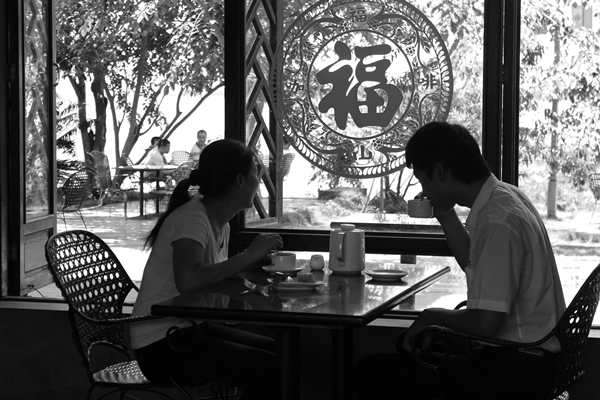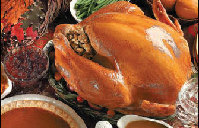Coffee break on island time
 |
|
Local residents in Hainan love to gather with friends and chat over coffee after work. [Photo by Mao Pengfei/China Daily] |
Modern, Western-style coffee machines are too complicated and delicate to capture the flavor. The locals brew the coffee in big iron kettles and drain it through cotton fabric or iron filters.
A-lan has been working in the flagship Fushan Coffee shop for six years, and specializes in brewing coffee.
She puts the ground coffee into a big pot of boiling water, stirs and waits until the aroma seeps out. Usually this process takes less than a minute. She scoops the golden brown coffee into a pot where it settles like silk.
"Perfect," she says as she lifts the pot, sets up the filter and pours the freshly brewed coffee into a white china coffee pot.
Hainan coffee can be enjoyed with sugar or condensed milk, but the locals recommend it black with its fresh and earthy body. The last sip from the bottom of the cup can tantalize the taste buds with the flavor of earth, wind and fire.
David Mino, a member of Specialty Coffee Association of America, visited Hainan for a barista competition in June and was amazed at how coffee had become a local beverage in a country famous for tea.
"Hainan coffee is like the classic espresso, but stronger. Every true coffee lover should not miss it," Mino says.
Xinglong: Coffee in the blood
Long before Starbucks swept the world, people in Hainan were starting the day with a cup of coffee - not in coffee houses, but at street stalls, while eating fried rice noodles or steamed buns.
Since the 1950s more than 13,000 overseas Chinese from 21 different countries and regions have relocated to the region, introducing coffee customs and farming in Xinglong, a southeastern town of Hainan.
"We grew up with coffee, and it's in our blood," says Liang Dingwei. "Xinglong coffee is full bodied, with a soft and sweet finish. You don't even need milk."
Since China's reform and opening-up in the 1980s, coffee has been available in all the markets. Unlike the fancy cafes of Beijing and Shanghai, where one cup can cost 30 yuan ($4.95), coffee has never been a luxury in Hainan.
"It's our daily drink," says Wu Chunguang, 34, who runs the small restaurant Waxili in Xinglong, where fresh coffee costing only 3 yuan is always the most popular item on the menu.
The aroma of coffee drifts across this small town every morning.
Thousands of miles away from the busy metropolises of Beijing and Shanghai, life here is full of ease and leisure. The locals love to gather with friends and chat over coffee after work.
Wu's father spent some time living in Indonesia, so Southeast Asian-style snacks are offered to complement the coffee.
"Coffee jelly is the best seller. Pumpkin cakes and tapioca cakes are also popular. I make them myself every morning from the recipe I learned from my father," Wu says. "The secret is the coconut cream. It's all homemade."
Most guests are locals, but travelers are increasingly stopping by to sit in wooden armchairs under a tree, and while away the day with the aroma of coffee wafting on the breeze and sunshine slanting through the leaves.




















